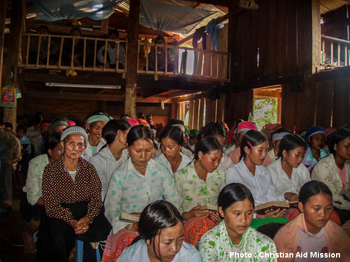By Mark Ellis

Vietnamese authorities have locked up at least 108 pastors for their faith in prisons where they could be poisoned if they’re not careful what they eat.
Prison conditions in Vietnam’s Central Highlands are unforgiving and primitive. If a prisoner fails to follow all orders it could bring fatal retribution, Su*, the leader of an indigenous ministry told Christian Aid Mission. Su was nearly killed during a seven-year prison term in the 70s and 80s.
“If you do not strictly follow the rules, they can put poison in your food,” he reported. “So you take a little bit, and if you feel something or want to vomit, you stop eating. A few people have died.”
Sixty-six pastors attempted to escape Vietnam, but were captured and are thought to be imprisoned by the authorities, but their whereabouts are unknown, Su noted.
“When the authorities called the approved church leader to say they would take him to see them, they got to the center and there was no one there,” he told Christian Aid Mission.
Authorities have beaten or threatened to imprison pastors for refusing their orders to merge their unregistered house churches into an officially approved church, Su said. One network of house churches with 3,000 members was ordered to merge congregations and meet in a facility holding no more than 500.
“The government wants to combine them to limit their growth and have more control,” he said. “If the pastors refused to sign a paper saying they would combine and that their gatherings would not go over 500 people, they would be beaten or thrown into prison.”
In rural areas authorities control church activity more strictly than they in urban settings, he said. Churches are prohibited from having small groups, holding Sunday school classes for children or adults, or having youth group meetings.
Children can only be taught about Christianity at home. Taking Communion and collecting offerings are forbidden, police monitor sermons to ensure nothing is said against communism, and only one leader is allowed for each church, according to Christian Aid Mission.
In Gia Lai Province, near the border with Kampuchea, authorities forced 12,000 Christians in 20 unregistered churches to combine at a single facility accommodating 1,600 people, Su reported. Rather than imprison those who resisted, authorities imposed fines.
Along with the 66 pastors behind bars, another 42 remain in prison even though the 15-year sentences they received in 2001 for practicing their faith has been completed, Su noted. The director suspected authorities are refusing to release them because of protests by Christians against the seizing of their property at the time of the arrests.
In spite of the risks, Su’s ministry teams go to several areas to proclaim Christ and train church leaders. There are 22 tribes in the Central Highlands that have no strong Christian presence, and the ministry has reached out to 10 of them, he told Christian Aid Mission.
For years the ministry chose one person who was receptive to the gospel from each village, led him to Christ and sent him back to evangelize his village. Su stopped the method when police began intercepting the returning evangelists and ordered them to refrain from preaching Christ, though some continued to do so anyway.
Now the ministry brings as many as 10 new Christians from different villages to its training base several times a year, then sends them back to their communities to spread the gospel.
“This keeps the local police from knowing what they were doing and where to intercept them,” Su said.
Evangelistic Bible studies rotate between different village homes to evade local authorities, he added.
In its efforts to proclaim Christ to unreached tribes, the ministry also arranges for converts from one tribe to reach out to a nearby tribe.
For training, Su uses Theological Education Extension (TEE). He has 7,850 people beginning to study the second level of TEE (the last six books), including 2,250 tribal-language users. The ministry gives out the books to people in mountain villages who cannot afford to buy TEE, which must be completed in order to enter government-approved seminaries. Su is raising support to print the second set.
*Name changed for security reasons.
To know more about Christian Aid Mission’s work in Vietnam, go here




Comments are closed.